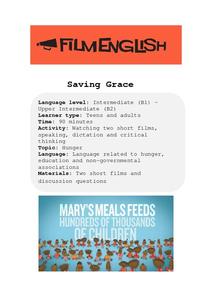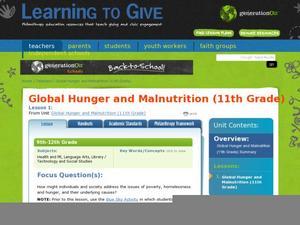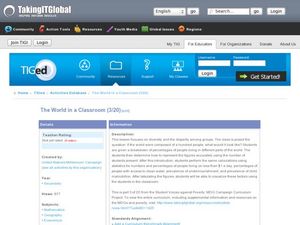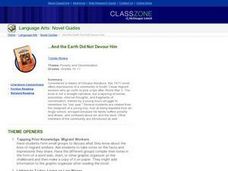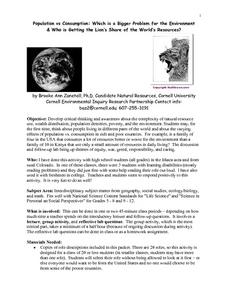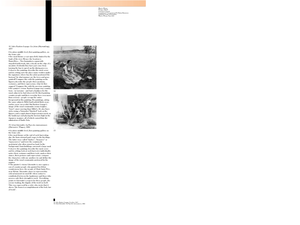Pulitzer Center
Food Insecurity
Food insecurity, whether as a result of food scarcity or a lack of nutritious food, is a growing and serious problem in the world today. After discussing the concept of food insecurity, learners listen to an NPR radio broadcast on the...
Curated OER
Global Women and Poverty
Students examine poverty and women in Senegal through a video. They work together to gather research about economic prosperity in different countries. They share their information with the class.
Film English
Saving Grace
Bring up the topic of world hunger in your class with two emotional videos. The short films are about a program for educating and feeding children around the world. Class members talk about poverty and pay close attention to the numbers...
Curated OER
Chapter 39: The Economics of Developing Countries
The disparity between the standards of living in industrialized countries versus developing countries has gotten wider - and this presentation can help your class learn why. With a multitude of key definitions and facts, these slides go...
Curated OER
Global Hunger and Malnutrition
Is there a difference between hunger and malnutrtion? Is this a problem only in third world countries? How does hunger and malnutrition affect the community? Why do these problems exist when the world produces enough food to feed...
Curated OER
Poverty Point Earthworks: Louisiana's Ancient Inhabitants
Students research the prehistoric earthworks site at Poverty Point, Louisiana. They compare the Louisiana artifacts and structure to the remains and knowledge of other ancient cultures. They present their research to the class.
Curated OER
Letters from the Heart: Designing for the Other 90% of the World's Population
Students explore varied aspects of the design process and learn that most products are designed to reach the worlds wealthiest 10%. In this activity, students work in groups to learn ways in which designers are attempting to rectify this...
Stanford University
Public Housing
The Fair Deal was meant to give Americans after World War II a basic standard of living. Those in public housing often found that promise fell short. Learners consider whether the effort was successful by evaluating images, testimonies,...
Curated OER
The World in a Classroom
Students calculate percentages of different kinds of people in the world. In this diversity lesson plan, students will see the percentages of different people and different incomes based on if the world only had 100 people in it.
Curated OER
Feeling Vulnerable
Students discover some of the ways the developing world is vulnerable to the impact and effects of natural disasters. They investigate some "natural disaster hotspots" around the globe and assess how vulnerable these areas are.
Global Oneness Project
Citizen Photojournalism
Matt Black's photo essay, "The Geography of Poverty" provides a shocking reminder of the poverty that exists in the United States. The resource not only focuses attention on poverty but also conditions that have given rise to situation...
Curated OER
Ayiti: Children of Haiti Summit
Ninth graders explore the core challenges faced by children in Haiti. In this World History lesson, 9th graders examine the impact poverty has on access to education, nutrition, basic healthcare, and child mortality. Students research...
Curated OER
...And the Earth Did Not Devour Him
Students examine impressions of a community of migrant workers in Texas who go north to pick crops. The lesson highlights the poverty and discrimination that a family suffers in the 1970's.
Curated OER
OCCUPATIONAL OXYMORON: Examining the Circumstances of the Hidden Working Poor
Students use the book, The WorkingPoor, as a basis for this lesson. They state their current understanding of poverty., work in groups to prepare presentations on different aspects of the working poor and give oral presentations.
Curated OER
Population Vs Consumption: Which is a Bigger Problem for the Environment & Who is Getting the Lion's Share of the World's Resources?
Students develop critical thinking and awareness about the complexity of natural resource use, wealth distribution, population densities, poverty, and the environment. They think about people living in different parts of the world and...
Curated OER
The Rural World Seen by Artists 1848-1914
Young scholars prepare to visit the art museum and view the rural world as seen by artists of 1848 - 1914. In this Monet lesson, students examine the haystacks series of artworks by Monet. Young scholars observe social change in the...
Curated OER
This Ain't No Tea Party!
Create food-safe bowls with your class, then organize a meal for the community using the class's bowls to serve. This lesson is based on the Empty Bowels Project, where school kids gain an understanding of global hunger through community...
Learning to Live
Attributes of a Civil Society
What makes a society civil? High school freshmen search for examples of justice, kindness, peace, and tolerance in news media and brainstorm how they can promote these attributes in their schools, communities, and world. The well-rounded...
Benjamin Franklin Tercentenary
Franklin’s Philadelphia: Another Point of View
While Benjamin Franklin enjoyed fame and success in colonial Philadelphia, that was not the experience of all coming to the British colonies. Young scholars trace the life of an indentured servant using a scholarly biography and reading...
Little Stones
How Can Poetry Make People Think and Care?
Can beautiful words change the world? Literary scholars discover how to paint their visions of change using poetry in a series of three workshops. Each independent topic gives participants a chance to examine their feelings about...
National Endowment for the Humanities
Societal Schisms and Divisions
The final lesson plan in the Crime and Punishment unit looks at the societal injustices depicted in Dostoyevsky's novel. Scholars examine the schisms between men and women, between wealth and poverty, between religion and skepticism, and...
Curated OER
Education, Design & Empowerment: Part One
Students consider the connection between poverty and education. In this language arts and social studies lesson plan, students research primary and secondary sources in order to explore the relationship between education and poverty.
Curated OER
Bank Loans Money to Start Businesses
After locating Latin American countries on a world map, children read about how microbanks are loaning money to help start small businesses. Involving both current events and economics, the teacher introduces the article with a map...
Curated OER
Literary Newspaper: Candide
Prejudice? Religious intolerance? Political sedition? Class distinction? Plight of women? Voltaire satire, anyone? A literary newspaper offers an opportunity for readers of Candide to make text-to-self and text-to-world connections as...
Other popular searches
- Poverty and World Hunger
- Third World Poverty
- Worksheets on World Poverty
- Economics World Poverty
- World Poverty Main Issues




